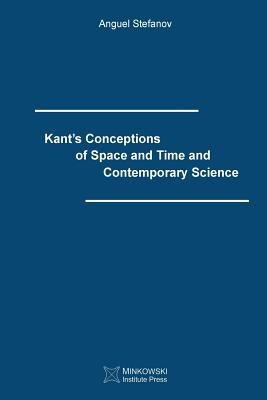
- We will send in 10–14 business days.
- Author: Anguel Stefanov
- Publisher: Minkowski Institute Press
- Year: 2015
- Pages: 126
- ISBN-10: 1927763428
- ISBN-13: 9781927763421
- Format: 15.2 x 22.9 x 0.7 cm, minkšti viršeliai
- Language: English
- SAVE -10% with code: EXTRA
Kant's Conceptions of Space and Time and Contemporary Science (e-book) (used book) | bookbook.eu
Reviews
Description
The book is engaged with the argumentation of original theses, as well as with putting forward theoretical reconstructions, which provide a new outlook at Kant's philosophical legacy concerning his conceptions of space and time, both pre-critical and critical (transcendental). The claim is defended that both in his first and in his last pre-critical work Kant has enunciated ideas, which have later proved to be of significance for the formation of contemporary physical and cosmological theories. Such is the idea about the relation between geometry and physics, as well as the one about the origin of incongruent counterparts. The latter could be looked upon as a proto-explanation of the breaking of mirror symmetry. It is also argued that traditional paradigmatic criticisms of Kant's transcendental conception of space and time stem out of misunderstandings, underpinned by philosophers and scientists who are visible figures in their respective cultural (and ideological) circles. The origin of familiar paradoxes connected with space and time, for instance with the notion of a flowing time, is found to be grounded in the classical conceptualization of space and time as separate autonomous entities.Because of its thematic content the book can attract the attention of a wide reading public: professional philosophers and scientists dealing both with scholarly research and teaching, students of philosophy and of history of science, and intellectuals concerned with seeking and explicating relations between philosophy and science.
EXTRA 10 % discount with code: EXTRA
The promotion ends in 22d.20:52:03
The discount code is valid when purchasing from 10 €. Discounts do not stack.
- Author: Anguel Stefanov
- Publisher: Minkowski Institute Press
- Year: 2015
- Pages: 126
- ISBN-10: 1927763428
- ISBN-13: 9781927763421
- Format: 15.2 x 22.9 x 0.7 cm, minkšti viršeliai
- Language: English English
The book is engaged with the argumentation of original theses, as well as with putting forward theoretical reconstructions, which provide a new outlook at Kant's philosophical legacy concerning his conceptions of space and time, both pre-critical and critical (transcendental). The claim is defended that both in his first and in his last pre-critical work Kant has enunciated ideas, which have later proved to be of significance for the formation of contemporary physical and cosmological theories. Such is the idea about the relation between geometry and physics, as well as the one about the origin of incongruent counterparts. The latter could be looked upon as a proto-explanation of the breaking of mirror symmetry. It is also argued that traditional paradigmatic criticisms of Kant's transcendental conception of space and time stem out of misunderstandings, underpinned by philosophers and scientists who are visible figures in their respective cultural (and ideological) circles. The origin of familiar paradoxes connected with space and time, for instance with the notion of a flowing time, is found to be grounded in the classical conceptualization of space and time as separate autonomous entities.Because of its thematic content the book can attract the attention of a wide reading public: professional philosophers and scientists dealing both with scholarly research and teaching, students of philosophy and of history of science, and intellectuals concerned with seeking and explicating relations between philosophy and science.


Reviews